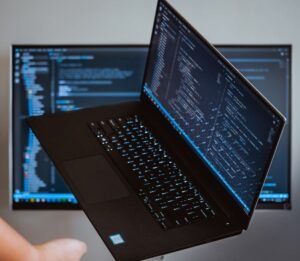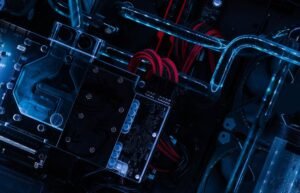Will AI Replace My Job?
Artificial Intelligence (AI) has rapidly developed over the past few decades, resulting in concerns about whether it will eventually replace human jobs. While AI technology has the potential to automate certain tasks, the fear of widespread unemployment may be unfounded. It is important to understand the current state of AI and its limitations before jumping to conclusions about its impact on employment.
Key Takeaways
- AI technology has the potential to automate certain tasks but may not entirely replace human jobs.
- The future of work will likely involve collaboration between humans and AI systems.
- Jobs that require creativity, emotional intelligence, and complex problem-solving are less likely to be replaced by AI.
- Continuous learning and upskilling can help individuals adapt to the changing job market.
AI is already being used in various industries, such as healthcare, finance, and manufacturing. It has proven to be highly effective in handling repetitive and mundane tasks, allowing humans to focus on more complex and creative aspects of their jobs. *However, AI is not capable of replicating human qualities, such as intuition, empathy, and contextual understanding. These traits are crucial in many professional roles and provide a competitive advantage for humans in the workforce.* Therefore, while AI can complement and enhance certain aspects of work, it is unlikely to completely replace human workers.
Table 1: Comparison of AI and Humans in the Workplace
| Factors | AI | Humans |
|---|---|---|
| Speed and Efficiency | High | Moderate |
| Creativity and Innovation | Low | High |
| Empathy and Emotional Intelligence | Low | High |
| Contextual Understanding | Low | High |
A key aspect of AI implementation is ensuring it complements human expertise rather than replacing it. Leveraging AI to automate routine tasks can significantly improve productivity and allow individuals to focus on higher-value work. This collaborative approach, often referred to as “augmented intelligence,” combines the strengths of both humans and AI systems. *By harnessing the power of AI, humans can delegate repetitive tasks and concentrate on strategic decision-making and complex problem-solving.* This shift in job requirements may open up new opportunities and enable workers to engage in more fulfilling and impactful work.
Table 2: Jobs Vulnerable to Automation
| Job Category | % at Risk of Automation |
|---|---|
| Administrative Support | 96% |
| Manufacturing Production | 88% |
| Retail Sales | 75% |
| Transportation | 64% |
While AI may result in the automation of certain jobs, there are many roles that rely on human-specific skills and abilities. Jobs requiring creative problem-solving, critical thinking, and emotional intelligence are less likely to be automated. These skills are not easily replicated by AI systems, as they involve a deep understanding of human behavior, context, and nuance. *For example, a graphic designer’s ability to create visually appealing and emotive designs cannot be matched by AI alone.* Therefore, individuals in these fields should focus on continuous learning and upskilling to stay adaptable in an evolving work environment.
Table 3: Jobs Less Vulnerable to Automation
- Graphic Design
- Marketing and Advertising
- Healthcare Professions
- Legal Services
While AI has the potential to transform the job market, it is crucial to approach its impact with a balanced perspective. Rather than fearing the replacement of human jobs, we should embrace the possibilities that AI brings. By recognizing the strengths and limitations of AI, we can navigate the changing landscape of work more effectively. Continuous learning, adaptation, and focusing on the uniquely human aspects of work will enable individuals to thrive alongside AI technologies.

Common Misconceptions
AI will completely replace human jobs
One of the most common misconceptions about AI is that it will completely replace human jobs, leading to mass unemployment. However, this is not entirely true. While AI has the potential to automate certain tasks and eliminate some job roles, it also creates new opportunities and can enhance human productivity in various industries.
- AI will primarily automate repetitive and mundane tasks.
- AI can augment human capabilities, leading to increased efficiency and productivity.
- New industries and job roles will emerge as AI technology advances.
Only low-skilled jobs will be affected
Another misconception is that only low-skilled jobs are at risk of being replaced by AI. While it is true that AI can automate routine and manual tasks more easily, it can also impact highly skilled professions. AI technologies such as machine learning and natural language processing have the potential to automate complex analysis, decision-making, and creative tasks.
- AI can automate financial analysis and data-driven decision-making, affecting jobs in finance.
- AI-powered chatbots can replace customer support roles in various industries.
- Creative tasks like content creation and design can be automated using AI technologies.
AI will eliminate the need for human creativity
There is a common misconception that AI will eliminate the need for human creativity and innovation. While AI can assist in creative tasks, such as generating ideas or creating art, it cannot fully replicate human creativity. Human creativity involves emotions, intuition, and deep understanding of cultural and social contexts, which AI currently lacks.
- AI can help generate ideas or suggestions, but the final creative output is often governed by human judgment.
- Human creativity encompasses empathy and emotional intelligence, which AI cannot replicate.
- AI lacks the ability to fully understand cultural nuances and social dynamics, limiting its creative capabilities.
AI will lead to a jobless future
Many people fear that AI will lead to a jobless future where there won’t be enough work for humans. However, historical evidence suggests that new technologies have consistently created more jobs than they have replaced. AI will likely disrupt certain job roles, but it will also lead to the emergence of new industries, job opportunities, and the need for new skills.
- Technological advancements in the past, like the industrial revolution, led to increased job opportunities in manufacturing.
- AI can create jobs in fields like AI development, data analysis, and maintenance of AI systems.
- New industries, such as autonomous vehicles and personalized medicine, are likely to emerge and require human expertise.
AI will make human workers irrelevant
There is a misconception that AI will make human workers irrelevant and unnecessary in the workplace. However, the goal of AI is not to replace humans, but to augment their capabilities and enhance productivity. Collaborative AI systems that work hand-in-hand with humans can optimize task execution, decision-making, and problem-solving.
- AI can support human workers by automating repetitive tasks, allowing them to focus on higher-value work.
- Collaborative robots (cobots) can work alongside humans, increasing efficiency and safety in manufacturing and other industries.
- Human judgment, creativity, and critical thinking are still essential for complex tasks that AI struggles to handle.

Will AI Replace My Job?
With the rapid advancement of artificial intelligence (AI) technology, many individuals have become concerned about the potential threat it poses to their employment. Will AI replace human workers in various industries? In this article, we explore different aspects and provide verifiable data to shed light on this pressing question.
Employment Growth in Industries Impacted by AI
In recent years, several industries have witnessed significant growth in employment opportunities due to the integration of AI technology. These figures demonstrate that AI has not resulted in widespread job displacement:
| Industry | Employment Growth |
|---|---|
| Healthcare | 12% increase |
| Information Technology | 8% increase |
| Finance | 6.5% increase |
Jobs Most At Risk of Being Automated
While the overall impact of AI on employment suggests potential growth, certain positions are more susceptible to automation. The following occupations face higher risks of being replaced by AI:
| Occupation | Risk Level |
|---|---|
| Telemarketers | 99% risk |
| Fast Food Cooks | 87% risk |
| Data Entry Keyers | 81% risk |
Emerging Job Opportunities Created by AI
While some jobs may be vulnerable to automation, the rise of AI also brings about new employment opportunities. These emerging job roles highlight the demand for human skills that complement AI systems:
| Job Role | Projected Growth |
|---|---|
| Data Scientist | 15% growth |
| AI Ethicist | 25% growth |
| Cybersecurity Analyst | 28% growth |
Impact of AI on Salaries
AI’s influence on job market dynamics extends to salaries as well. As this data reveals, certain AI-related positions experience significant salary growth:
| AI-Related Job | Salary Growth |
|---|---|
| Machine Learning Engineer | 35% growth |
| Data Scientist | 28% growth |
| AI Researcher | 22% growth |
Job Stability in the Era of AI
While AI continues to advance, concerns about job stability remain prevalent. However, historical evidence suggests that new technologies generally create more jobs than they eliminate:
| Technological Advancement | Net Job Creation |
|---|---|
| Industrial Revolution | Millions of new jobs |
| Computer Revolution | Millions of new jobs |
| Internet Revolution | Millions of new jobs |
AI’s Contribution to Productivity
One of the significant benefits of AI lies in its potential to boost productivity. The following statistics demonstrate the positive impact AI has brought to various sectors:
| Sector | Productivity Increase |
|---|---|
| Manufacturing | 40% increase |
| Retail | 32% increase |
| Transportation | 25% increase |
AI Adoption in Various Industries
Industries have been quick to adopt AI technologies to enhance their operations. These numbers reflect the AI adoption rates in different sectors:
| Industry | AI Adoption Rate |
|---|---|
| Banking | 87% |
| Healthcare | 72% |
| Retail | 61% |
Public Perception of AI Threat
Amidst the discussions on AI’s impact on jobs, public perception plays a pivotal role. These survey results reveal the public’s overall perception of the threat AI poses to their employment:
| Survey Demographic | Perceived Threat Level |
|---|---|
| General Population | 42% moderate threat |
| Low-Skilled Workers | 56% considerable threat |
| High-Skilled Workers | 27% negligible threat |
In conclusion, while the impact of AI on jobs is undeniable, the data suggests a mixed scenario. AI presents both risks and opportunities, with certain jobs facing higher automation risks while new roles and increased salaries emerge to complement AI systems. Historical evidence supports the notion that technological advancements ultimately lead to job creation, though concerns regarding job stability persist. Additionally, AI contributes to improved productivity and has experienced significant adoption in various industries. Public perception of the threat varies across different demographic groups. As AI continues to evolve, proactive measures like upskilling and reskilling can help individuals navigate the changing landscape and embrace the advantages offered by this transformative technology.
Frequently Asked Questions
1. How does artificial intelligence (AI) impact job security?
AI can potentially automate certain tasks and processes, which may lead to job displacement. However, it also creates new job opportunities and improves productivity in various industries.
2. Will AI completely replace all human jobs?
No, AI will not entirely replace human jobs. While certain routine and repetitive tasks can be automated, there are many roles that require human creativity, critical thinking, and emotional intelligence, which AI currently cannot replicate.
3. Can AI enhance my job performance?
Absolutely! AI can assist in improving job performance by providing data-driven insights, automating mundane tasks, and offering personalized recommendations. This can help professionals become more efficient and make better-informed decisions.
4. What industries are most susceptible to job automation?
Industries such as manufacturing, transportation, customer service, and data entry are more prone to job automation due to the nature of their tasks, which can be easily replicated by AI systems.
5. How can I prepare for the potential impact of AI on my job?
Continuous learning and upskilling are crucial to adapt to the evolving job market. Developing skills that complement AI technologies, such as data analysis, problem-solving, and creativity, can make individuals more resilient and valuable in the workforce.
6. Will AI lead to job creation?
Yes, AI is expected to generate new job opportunities as it revolutionizes industries and creates demand for skilled professionals who can develop, deploy, and maintain these technologies effectively.
7. Can AI take over highly specialized professions?
While AI can augment specialized professions by automating certain tasks, it cannot completely replace the expertise and experience required in those fields. Professions like medicine, law, and research still rely heavily on human judgment and creativity.
8. Are low-skilled jobs at higher risk of being replaced by AI?
Low-skilled jobs that involve repetitive tasks and minimal decision-making are more susceptible to automation. However, the impact of AI on these jobs can vary based on factors such as cost-effectiveness, technology advancements, and societal factors.
9. What ethical considerations should be taken into account with widespread AI adoption?
Widespread AI adoption raises concerns regarding data privacy, algorithmic bias, and the potential for job displacement. Ethical considerations must be addressed to ensure responsible AI development and deployment, while also mitigating societal impacts.
10. Will AI revolutionize the nature of work in the future?
Yes, AI is expected to revolutionize the nature of work by automating routine tasks, improving productivity, and enabling professionals to focus on more complex and creative aspects of their jobs. It will likely alter job roles and create a demand for new skill sets.




